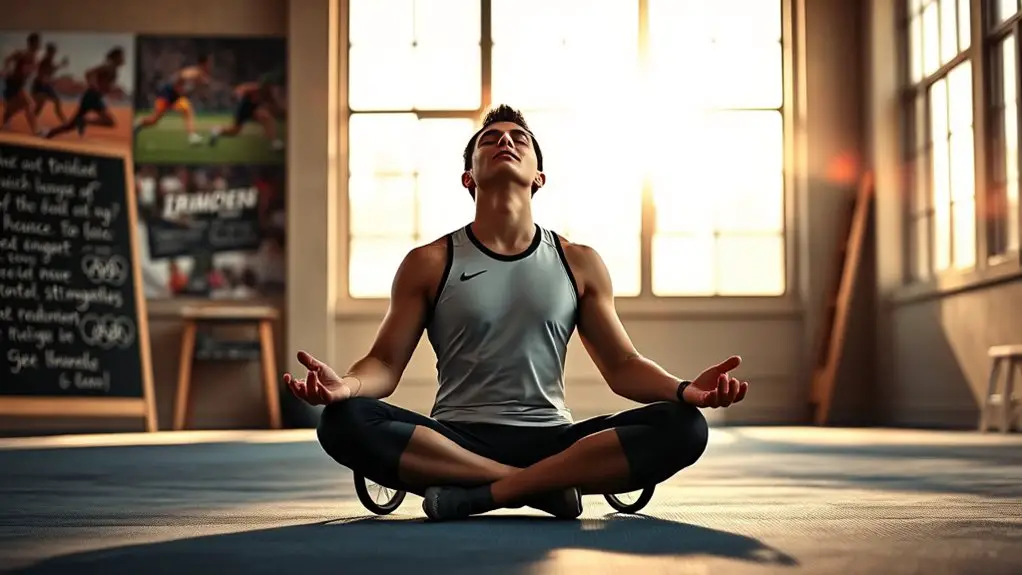For Paralympic athletes, mental training techniques are essential for overcoming challenges. Focus on visualization to mentally rehearse performances and boost confidence. Incorporate mindfulness practices to enhance your focus and reduce anxiety during competitions. Setting clear, achievable goals helps maintain motivation, while positive self-talk promotes resilience. Managing stress is important, so use deep breathing exercises and structured routines to support your performance. Explore more strategies to optimize your mental game and elevate your athletic journey.
Understanding the Importance of Mental Training
While many people focus solely on physical training, understanding the importance of mental training is essential for Paralympic athletes. You've got to cultivate mental strength alongside your physical abilities. It's not just about how hard you can push your body; it's also about how resilient you can be emotionally.
By honing your mental skills, you gain the freedom to face challenges head-on and embrace setbacks as opportunities for growth. Emotional resilience allows you to bounce back from adversity, whether it's a tough competition or a personal struggle. Developing mental toughness can significantly enhance your performance and overall experience in sports.
When you prioritize mental training, you're not just preparing for the next race or event; you're building a robust mindset that supports your journey. This combination of physical prowess and mental fortitude will empower you to break boundaries, both in sport and life. Remember, true strength comes from within, and developing it can set you free.
Visualization Techniques for Success
Visualization techniques can be a powerful tool for achieving success as a Paralympic athlete, especially when you harness the mind's ability to create vivid mental images. By engaging in mental imagery, you can mentally rehearse your performances, envisioning every detail from start to finish. This practice, known as image rehearsal, allows you to simulate the experience of competition, enhancing your confidence and reducing anxiety.
Picture yourself crossing the finish line, feeling the rush of victory. As you visualize, immerse yourself in the emotions, sensations, and sights of success. The more detailed your mental imagery, the more effective it can be.
Incorporate this technique into your training routine, dedicating time to visualize specific skills or routines. By doing so, you'll not only develop a stronger mental game but also create a sense of freedom, allowing you to express your true potential when it counts the most. Moreover, visualization activates neural pathways similar to actual performance, further enhancing your ability to succeed in competitions.
Mindfulness Practices for Enhanced Focus
Building on the mental imagery techniques you've practiced, mindfulness can further enhance your focus and performance as a Paralympic athlete. By incorporating mindfulness meditation into your routine, you'll cultivate a heightened awareness of the present moment, allowing you to let go of distractions and tune into your body's signals.
Start with focused breathing—take deep, intentional breaths to ground yourself. This simple practice helps you center your thoughts and maintain clarity, especially during high-pressure situations. As you breathe in and out, visualize each breath as a wave of energy, washing away doubts and anxiety. Additionally, research shows that meditation can improve concentration and reduce anxiety, further enabling athletes to perform at their best.
Building Resilience Through Cognitive Strategies
To build resilience, you can harness powerful cognitive strategies that enhance your mental strength. Techniques like mental visualization, positive self-talk, and effective goal-setting can help you overcome challenges and stay focused on your performance. By integrating these strategies into your training routine, you'll be better equipped to face obstacles head-on. Additionally, incorporating mindfulness techniques into your preparation can significantly reduce competition anxiety and improve overall focus.
Mental Visualization Techniques
Many athletes find that mental visualization techniques can considerably enhance their performance and resilience. By using mental imagery, you can create vivid scenarios that engage your senses, helping you feel the environment of competition. Incorporating relaxation techniques into your pre-competition routines can further calm your mind, allowing for better emotional regulation. Focus enhancement is essential, and image rehearsal allows you to mentally practice specific skills, reinforcing your confidence. Cognitive rehearsal sharpens your tactical understanding and prepares you for various outcomes. Regular mental rehearsal not only boosts your athletic performance but also builds resilience, enabling you to navigate challenges with ease. Embrace these strategies, and you'll find greater freedom in your approach to sport and life.
Positive Self-Talk Practices
Positive self-talk practices can greatly enhance your mental resilience and performance as a Paralympic athlete. By incorporating effective affirmations and self-talk exercises into your daily routine, you can foster a positive mindset. Here are three powerful techniques to evaluate:
- Daily Affirmations: Create a list of empowering statements that resonate with you. Repeat them each morning to set a positive tone for your day.
- Mindful Self-Talk: During training, pay attention to your inner dialogue. Replace negative thoughts with constructive phrases that motivate you.
- Visualization and Self-Talk Combo: As you visualize success, use self-talk to reinforce your capabilities. This combination builds confidence and mental strength.
Embrace these practices to open up your full potential and achieve freedom in your performance!
Goal-Setting Strategies
While setting goals might seem straightforward, it's an essential aspect of building resilience for Paralympic athletes. You need a long-term vision to guide your journey, creating a clear path toward your ultimate aspirations. Break this down into short-term objectives that keep you motivated and focused on daily progress. These smaller goals act as stepping stones, allowing you to celebrate victories along the way, which reinforces your determination. Embrace flexibility; if something doesn't work, adjust your objectives without losing sight of your vision. This adaptability not only builds resilience but also empowers you to overcome obstacles. Remember, each goal achieved brings you one step closer to your ultimate dream, paving the way for freedom in your athletic pursuits.
Goal Setting for Optimal Performance
When you're aiming for peak performance, setting clear and achievable goals is essential. Using the SMART goals framework can help you create targets that are specific, measurable, achievable, relevant, and time-bound. Tracking your performance milestones will also keep you motivated and focused on your journey to success. Additionally, regular self-assessment helps in recognizing areas for improvement that can enhance your overall performance.
SMART Goals Framework
Setting goals is essential for any athlete, especially for Paralympic competitors who face unique challenges. Utilizing the SMART criteria can help you create effective goals that guarantee proper goal alignment. Here's how to apply it:
- Specific: Define clear, focused goals. Instead of saying "I want to improve," aim for "I want to reduce my sprint time by 2 seconds."
- Measurable: Establish how you'll track progress. Use timers or performance metrics to gauge your improvement.
- Achievable: Set realistic goals that challenge you but are still attainable based on your current abilities.
Performance Milestones Tracking
Tracking performance milestones is essential for ensuring that you stay on course toward your goals. By implementing effective performance tracking, you can celebrate your progress and identify areas for improvement. Start with clear, achievable milestones that align with your ultimate objectives. Regular milestone assessments will give you insight into your journey, allowing you to adjust your training and mental strategies as needed. This process not only keeps you motivated but also fosters a sense of freedom in your athletic pursuit. Remember, each small victory contributes to your overall success, empowering you to push boundaries and reach new heights. Embrace this journey and let your milestones guide you toward peak performance in every aspect of your training.
Developing a Positive Mindset
A positive mindset can be a game-changer for Paralympic athletes, influencing both performance and overall well-being. By embracing mindset shifts, you can reveal new levels of potential. Here are three key techniques for confidence building:
- Visualize Success: Picture yourself achieving your goals. This mental imagery can create a powerful connection between your mind and body, enhancing your confidence.
- Practice Gratitude: Acknowledge your achievements and the support around you. Gratitude shifts your focus from obstacles to opportunities, fostering a positive outlook.
- Set Intentions: Start each training session with clear intentions. This helps you stay focused, reminding you of your purpose and driving your passion. Engaging in mindfulness meditation can further enhance your ability to maintain this positive mindset during challenging moments.
The Role of Self-Talk in Performance
Self-talk plays an essential role in shaping your performance as a Paralympic athlete. The way you communicate with yourself can either elevate or hinder your success. Embracing effective self-talk strategies can lead to significant performance enhancement. Instead of focusing on doubts or fears, shift your inner dialogue to affirmations that inspire confidence and resilience.
For instance, remind yourself of past achievements or visualize your goals with positive statements. This approach not only uplifts your spirit but also creates a winning mindset. Engaging in positive self-talk can significantly influence your overall performance and motivation.
When you encounter challenges during training or competition, use self-talk to break down obstacles into manageable parts. Replace negativity with words that empower you to push through and embrace your journey.
Stress Management Techniques
While competing at high levels, managing stress effectively becomes essential for Paralympic athletes. You can enhance your performance and well-being through various stress management techniques. Here are three key strategies:
- Breathing exercises: Utilize deep, controlled breaths to promote anxiety reduction and emotional regulation. This simple practice can help you stay grounded when pressure handling feels overwhelming.
- Relaxation techniques: Engage in mindfulness or progressive muscle relaxation to combat mental fatigue. These methods can create a sense of calm and improve your focus.
- Time management: Prioritize your tasks to alleviate performance anxiety. By organizing your schedule, you can guarantee you're dedicating enough time to training and rest, fostering effective coping strategies.
Implementing these techniques will empower you to tackle stress head-on, allowing you to enjoy the freedom of your athletic journey. Staying hydrated is also crucial, as hydration supports optimal performance, which can further enhance your focus and energy levels.
The Power of Routine and Consistency
Establishing a consistent routine can considerably enhance your performance as a Paralympic athlete. When you create a structured daily plan, you're not just organizing your time; you're harnessing the routine benefits that come with it. A reliable schedule allows you to focus on training without the mental clutter of uncertainty.
The consistency impact of sticking to your routine can lead to improved skill acquisition, heightened mental resilience, and even increased motivation. Over time, these small, repeated actions build a strong foundation for success. You'll find that the freedom you seek in your performance comes from knowing exactly what to expect from yourself each day. Additionally, a well-structured routine can enhance your cardiovascular health, which is essential for sustaining performance during training and competitions.
Frequently Asked Questions
How Can Family Support Enhance Mental Training for Athletes?
Family support can greatly enhance your mental training by providing the encouragement you need to push through challenges. When your family stands by you, it fosters emotional resilience, allowing you to bounce back from setbacks more easily. Their belief in your abilities can empower you, giving you the freedom to take risks and aim for your goals. With their support, you're more likely to stay motivated and focused on your journey.
What Role Does Nutrition Play in Mental Training Effectiveness?
Nutrition plays an essential role in mental training effectiveness. When you focus on nutrition timing, you can optimize your energy levels, helping you stay sharp during training and competition. Don't forget about hydration strategies, either; staying well-hydrated keeps your mind clear and your body responsive. By fueling your body properly, you're not just enhancing physical performance, but also creating the mental resilience needed to tackle challenges and enjoy the freedom of your sport.
Are There Specific Mental Techniques for Different Disabilities?
When it comes to mental training, adaptive strategies are essential for different disabilities. You'll find that individualized approaches can help you access your full potential. Whether you're focusing on visualization, mindfulness, or goal-setting, tailoring these techniques to your unique needs empowers you. Embracing these methods not only enhances your mental resilience but also gives you the freedom to thrive in your journey, no matter the challenges you face.
How Can Athletes Overcome Mental Blocks During Competitions?
When you face mental blocks during competitions, you can use visualization techniques to imagine your success. Picture yourself overcoming obstacles and achieving your goals. Pair this with self-talk strategies; remind yourself of your strengths and past victories. Instead of focusing on doubt, shift your mindset to a place of freedom and possibility. Embrace the challenge, trust your training, and allow yourself to perform without fear. You've got what it takes to break through!
What Are Common Misconceptions About Mental Training for Athletes?
You might think mental training's just for elite athletes, but that's a myth debunking waiting to happen. Many athletes face perception challenges, believing they should only focus on physical prowess. In reality, mental conditioning's essential for everyone, enhancing focus and resilience. It's not some mystical art; it's about developing strategies that empower you. Embracing this can free you from limitations, allowing your true potential to shine, whether you're on the field or in everyday life.




